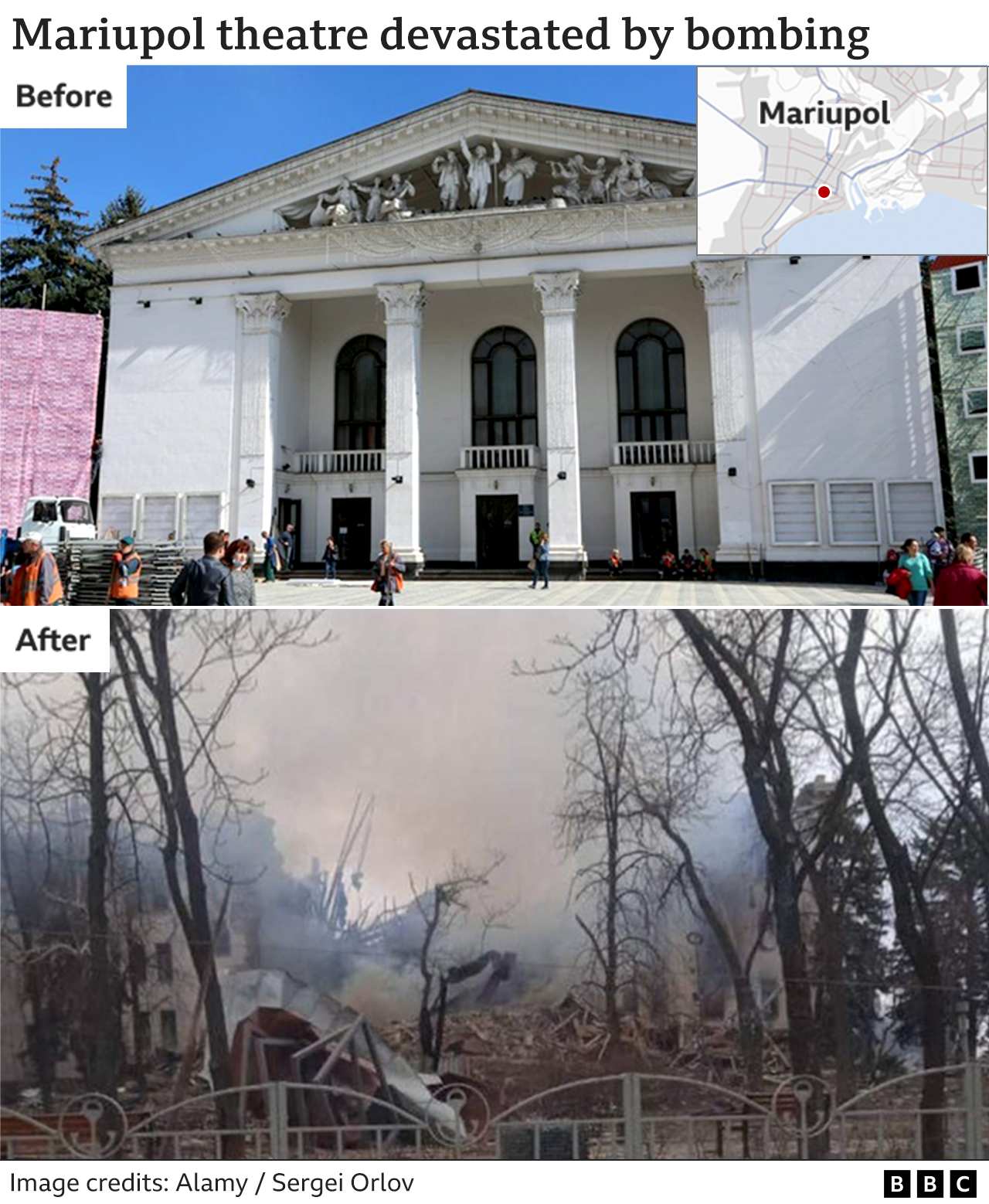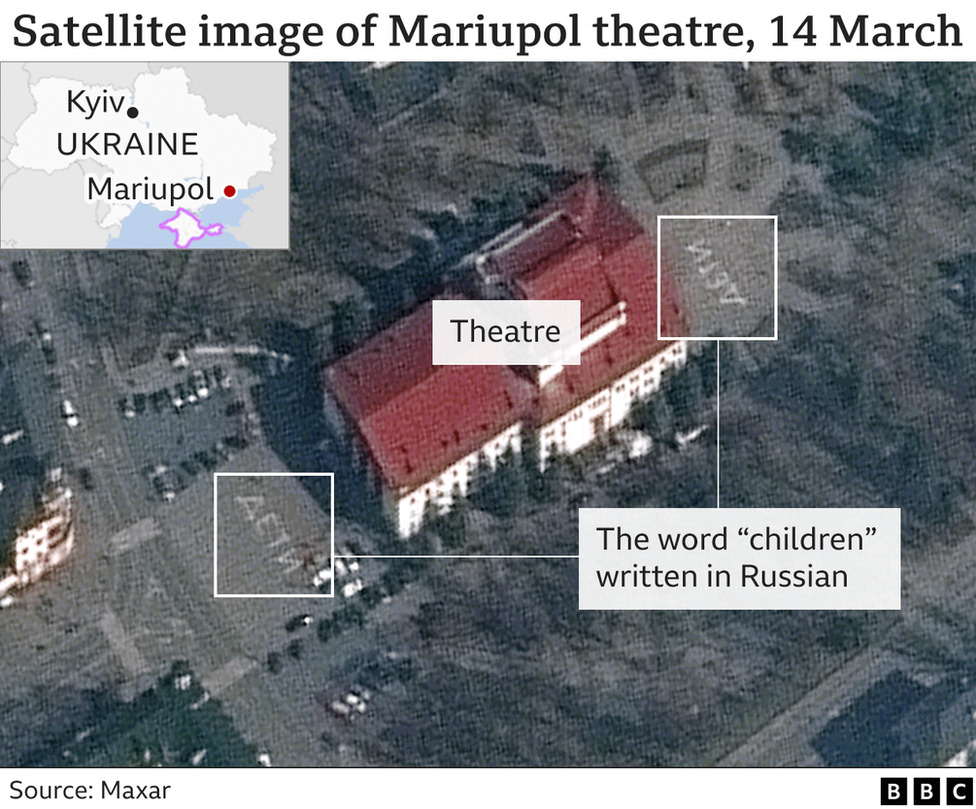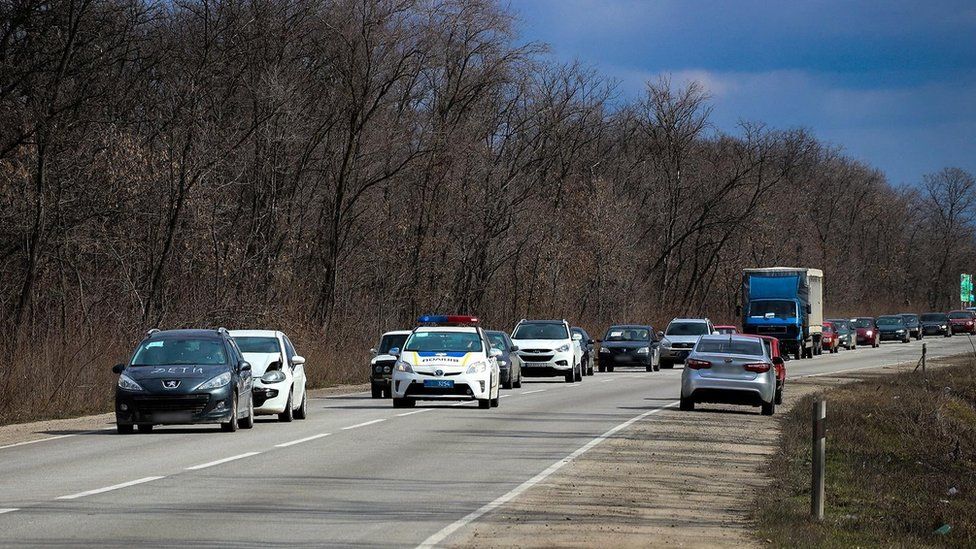Mariupol theatre: 'We knew something terrible would happen'
Civilians are said to be emerging alive from the ruins of a theatre that, according to Ukrainian authorities, was bombed by Russia in the city of Mariupol. Despite pictures of devastation at the scene, many who were sheltering there are thought to have survived in a basement that withstood Wednesday's attack.
For 10 days, that basement was a refuge for Kate, a 38-year-old Mariupol native, and her son, who is 17. Their own home, like many others in the besieged city, had been destroyed by Russian attacks, and they thought the Donetsk Regional Theatre of Drama was a place where they would be relatively safe.
Mother and son squeezed in the building's dark rooms, corridors and halls with dozens of other families. Some women, Kate said, carried babies that were just four or five months old.
"In the beginning, it was really tough, because we didn't have a well-organised food supply. So on the first two days, adults didn't have any food," Kate, who used to work at the city's zoo shop and did not want to give her full name, said. "We gave food only to the children."
They slept on improvised beds made with soft parts of auditorium seats which had been put together on the floor. The seats made of wood, she said, were cut in parts and used as firewood for them to cook. "Around the theatre there wasn't enough trees we could use, and it was too dangerous to go outside".


For almost three weeks, Mariupol has been under constant shelling by Russian forces, which have completely surrounded the city. About 300,000 people are trapped, with no electricity, gas or running water. Food and medicine are running low, as Russia has prevented the delivery of humanitarian aid.
Four days after she arrived, Kate said, Ukrainian forces managed to send some food supplies and a field kitchen to the theatre, and "we [started] cooking something". They would have soup, and sometimes oatmeal, for lunch, and tea with biscuits for dinner.
The imposing Soviet-era building in Mariupol's city centre, next to the Sea of Azov waterfront, had been designated as a shelter for civilians. Sergei Orlov, the city's deputy mayor, said up to 1,200 people had been there. Human Rights Watch, citing interviews with evacuees, put that number at between 500 and 800.
As Russia's relentless assault continued, Kate said the buildings around the theatre had been either damaged or destroyed. "We knew we had to run away because something terrible would happen soon," she said.

A day before the attack, Kate and her son left the site. "We jumped in a car while the theatre and the area were being shelled," she said. They shared the vehicle with a family of four, who had brought four dogs and a cat.
"We asked to go with them, because we didn't have our own [car]," she said. They were part of convoy of about 2,000 cars that escaped Mariupol on Tuesday.
Mariupol city council said a Russian plane dropped a bomb on the theatre, calling the attack "deliberate and cynical". Russia denied it had targeted the site but, in Mariupol alone, its attacks had already hit several civilian buildings including a hospital, a church and countless apartment blocks.
Satellite images released by the US company Maxar taken on Monday showed that the Russian word for "children" had been marked on the ground in large letters in two locations outside the building, to warn Russian jets away.
 Image source, Reuters
Image source, ReutersVideo of the aftermath showed smoke billowing from the building's collapsed façade. But with communications with the city almost completely cut off, the numbers of survivors or possible casualties were still not clear, almost 20 hours later.
Dmytro Gurin, a member of the Ukrainian parliament and originally from Mariupol, said the shelter in the basement of the building withstood the attack, and that teams were trying to clear the rubble which covered the entrance to the site. "It looks like most of them have survived and are OK," he said.
But the rescue efforts were tricky, he said, as Russia had continued to attack the area. "Shelling never stops and artillery never stops and airplanes are dropping bombs," he said, "so it's really difficult".
The city council estimates about 80% to 90% of the city's buildings have either been damaged or destroyed by Russia, which has attacked the city almost non-stop since it invaded Ukraine, three weeks ago. Entire neighbourhoods have been turned into wasteland.
Local authorities say at least 2,400 people have been killed in Mariupol, although they acknowledge this is likely to be an underestimate. Many of the dead are being buried in mass graves.
After leaving Mariupol, Kate was headed to the city of Lviv, in western Ukraine, a region that has been largely spared of attacks. "The first day after we managed to get out, I couldn't talk. We all just cried", she said. "But now it feels like there are no tears left. I don't think this pain will ever disappear."



No comments